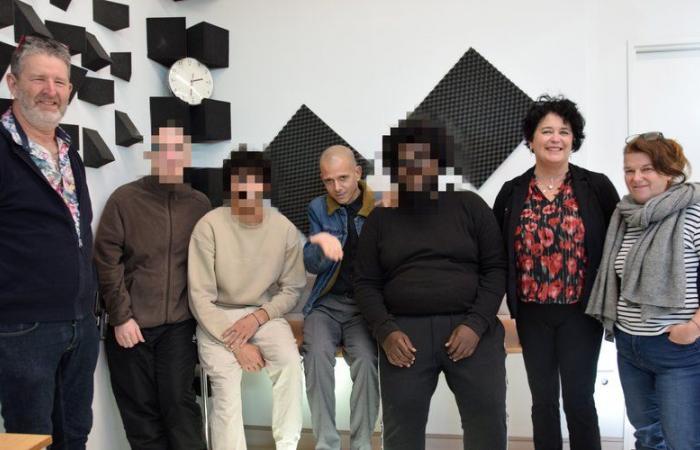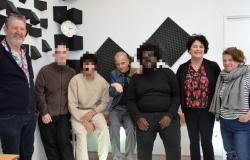
the essential
Abdellah Taïa, author of the novel “The Bastion of Tears” went to the Rodez remand center as part of the Goncourt of prisoners for which he is in the running. A lively, impactful, “overwhelming” encounter for the writer who has already won the December Prize and the French Language Prize.
A few hours before receiving his French Language prize, at the great Brive book fair, among literary pundits, the writer Abdellah Taïa spent three hours with inmates from the Rodez remand center. Three intense hours, with lively exchanges, without superficiality. Rough at times, as can be his eleventh novel, “Le Bastion des tears” for which he accumulates awards. Rough as was his life, the one he returns to in his novel. “My character has experienced horrible things, I have experienced even more horrible things”he says.
“It’s more intense than in literary salons”
His homosexuality, the rapes he suffered, poverty… and his sisters. Those who opened the way for this novel that took him ten years to structure and two years to write. With the six inmates who came to meet him, “The Bastion of Tears” was a space of freedom in which very diverse themes were discussed. From child abuse to the weight of secrets, including homosexuality and this form of hypocrisy that can take over society. And even the writing style was discussed, in free, open discussions.
“I must admit that it’s more intense than in literary salons”says Abdellah Taïa, who had spent a few days previously in the Versailles women’s prison and was also preparing to go to the remand centers in Saintes, Grenoble and Marseille. A “tour” which is part of the Goncourt of prisoners for which his novel is in the running, after having been part of the first Goncourt selection. “I would be so proud if I got this award”he tells the inmates, to whom he told about his childhood in Salé, not far from Rabat, in Morocco, where a prison was built right where he used to play. “I saw the walls go up and up… they built a prison in the middle of the inhabitants for the inhabitants. So we often went there.”
Isabelle Reclus, local education manager, and Marc Delzescaux, primary school teacher, were very proud to be able to welcome this writer who was as sensitive as he was impactful. And were able to appreciate the quality of the exchanges throughout this morning, as did Yvanne Morantin, Spip coordinator.
“When reading your book, I felt like I was reading Arabic in the sentence structure”says an inmate. “I didn’t want to fall into the trap of learning French to be better than my mother who is illiterate. It’s her that I think of when I write, not Proust or Victor Hugo.” Abdellah Taïa says that at a very young age, he started writing anything and everything in a notebook. “I didn’t do it to become a writer but to master French, because people made fun of those who didn’t master it well. And I find that very unfair”. “Did you send this book to your sisters?” asks another. “I sent them. But I didn’t write this book to do harm. I want to move towards love that can be renegotiated”he replies. His character asks the question of forgiveness to his sisters whom he loves but who have said nothing about the violence he suffered. But which indirectly opened the way for him to write this novel. Another inmate calmly explains that he has read the novel twice. He cried, because “many things resonated with him” upon reading it.
Abdellah Taïa then shows himself to listen. In sharing. “To get better in life, someone else has to listen.” With another he loses his temper. “What tolerance are we talking about? The one that says okay, you’re gay, but don’t come bothering me with that?” The novelist narrows his eyes when an inmate talks to him about the condition of disabled children on the islands. “You have to write on it!”
“You are the Goncourt of prisoners”
Sometimes bursts of laughter ring out. Silences too. We are no longer in a remand center but in a literary salon. Abdellah Taïa gives his reading advice, talks about his books that have had an impact on him. A participant asks for a pencil to write down. Hours passed. Quickly. The author asks everyone to give him a word, a color, “something positive that I can take with me”.
It’s time to leave. Handshakes, photos, thanks. Possible that some will reread “The Bastion of Tears” after this meeting. “For me, you are the Goncourt of prisoners”says one of them, who has read the other novels in the selection. Once everyone has left, Abdellah Taïa slips: “These are heartbreaking encounters.” He goes to Brive, by train, to collect his French Language prize. He will proclaim everything that this means to him in front of an audience who will give him a standing ovation. The Goncourt detainees will be assigned to him on December 17. If he wins, in Rodez, inmates will applaud. Others may read it.





